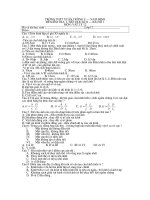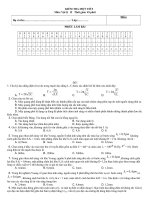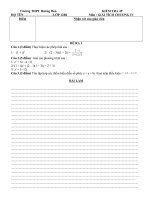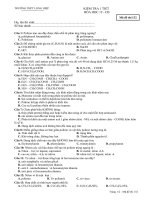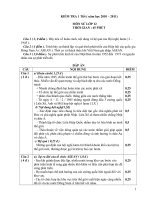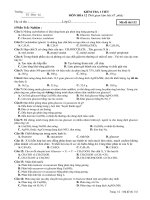KIỂM TRA 1 TIẾT 12 CTC
Bạn đang xem bản rút gọn của tài liệu. Xem và tải ngay bản đầy đủ của tài liệu tại đây (79.02 KB, 2 trang )
NAME:…………………………………………. ONE PERIOD TEST
GRADE:……..
I.Chọn từ có phần gạch chân phát âm khác với từ còn lại.(1m)
1. A. naked B. blessed C. discussed D. learned
2. A. passed B. realized C. wished D. touched
3. A. jumped B. picked C. relaxed D. suited
4. A. horses B.chooses C. roses D. rises
5. A.grapes B.roofs C. hats D.chairs
II.Chọn từ có trọng âm chính nhấn vào âm tiết có vị trí khác với những từ còn lại.(1m)
1. A. cosmetic B. comfortable C. property D. surgery
2. A. surpass B. surrender C. surround D. surface
3. A.visit B.open C.begin D.attract
4. A. introduce B. company C. comfortable D. formal
5. A. independent B. conversation C. restaurant D. cigarette
III.Chọn câu trả lời đúng nhất.(5ms)
1. His parents never allowed him _____ .
A. to smoking B. smoked C. smoking D. to smoke
2. I’ll have to ………… to you, otherwise he will hear.
A. whisper B. say C. whistle D. shout
3. ………… it was raining very heavily, he went out without a raincoat.
A. Although B. In spite of C. However D. In spite
4. She has gone abroad. She will return …………
A. for two years B. in two years’ time C. by two years’ time D. for two years’ time
5. Peter: Good morning, Mr. Brown. How are you?
Mr. Brown: _______
A. Not bad. You? B. So long C. I’m fine, thank you D. Morning, Peter. And you?
6.Professor Berg was very interested in the diversity of cultures all over the world.
A.changes B.conservation C. number D.variety
7.People are busy buying gifts, cleaning and decorating the house and cooking traditional foods.
A.favourite B. daily C.customary D. national
8.Do you believe __________ “contractual” marriage?
A.in B.at C.to D.about
9.In the past, parents usually decided __________ the marriage of their children.
A.at B.about C.on D.to
10.Do you agree that a happy marriage should be based __________ love?
A.for B.on C.at D.with
11.My mother is very busy at work and she usually doesn’t come home ____ very late at night.
A. until B. after C.before D. at
12. We are a very ____ family. All of us have very close relationship with one another.
A.strange B. friendly C. typical D.close-knit
13.My ______ in their family is helping my younger brother with his study.
A. task B. responsibility C. job D.activity
14. When I came to visit her last night, she ____ a bath.
A. was having B.has C. is having D.had
15.Mary ____ in London for 15 years.
A. is living B. was living C. lives D. has lived
16. While I ____ along the road, I saw a friend of mine.
A. was cycling B. cycled C. have cycled D. had cycled
17. Your last job was a bank manager, _____ it?
A. doesn’t B. didn’t C. wasn’t D. isn’t
18. Helen said, “ I’m watching the late night show.”
Helen said ____ the late night show.
A. they were watching B. you watched C. she was watching D. Helen is watching
19. Peter said, “ They were interested in other countries.”
Peter said ____ interested in other countries.
A. he had been B. he was C. they were D. they had been
20. Mrs Miller said, “I don’t feel better now.”
Mrs Miller said she ____ feel better ____.
A. they not / now B. she doesn’t / then C. she didn’t / then D. they didn’t / now
21. Phil asked me, “Were you at the party?”
Phil asked me ____ at the party.
A. had I been B. if I had been C. whether I was D. B&C are correct
22. My brother gets used _____ ten hours a day.
A. work B. working C. worked D. to working
23.Would you mind ____ me a hand?
A. give B. gave C. to give D. giving
24. “ Did you like the book?” “ Well, after I ………… the book, I was a bit disappointed”.
A. I am reading B. I have read C. having read D. had read
25. Do you spend a lot of time ………… to music.
A. listen B. to have listened C. to listen D. listening
IV. Chọn phần gạch dưới cần chỉnh sửa để câu trở thành chính xác.(2ms)
1. I asked(A) him how far was it(B) to the station if(C) I went there by taxi(D).
2. All of(A) my students wondered(B) how many(C) people lived in Tokyo? (D)
3. They asked me that(A) I could(B) do the(C) shopping for(D) her.
4. Her mother ordered(A) her do not go(B) out with him(C) the night before(D).
5. After said(A) goodbye to(B) my parents, I went (C)to school with (D)my sister.
6. Although her pain(A), she tried(B) to walk (C)to the auditorium to attend(D) the lecture.
7. Although(A) my parents are very busy at (B)work, but(C) they try to spend much(D) time for their
children.
8. They were all(A) looking forward to spend (B)their holiday at(C) the seaside the following summer(D).
V.Đọc đoạn văn sau rồi chọn câu trả lời đúng nhất.(1m)
Ever since humans have inhabited the earth, they have made use of various forms of communication. Generally, this
expression of thoughts and feelings has been in the form of oral speech. When there is a language barrier, communication
is accomplished through sign language in which motions stand for letters, words, and ideas. Tourists, the deaf, and the
mute have had to resort to this form of expression. Many of these symbols of the whole words are
very picturesque and exact and can be used internationally; spelling, however, cannot.
Body language transmits ideas or thoughts by certain actions, either intentionally or unintentionally. A wink can be a
way of flirting or indicating that the party is only joking. A nod signifies approval, while shaking the head indicates a
negative reaction.
Other forms of nonlinguistic language can be found in Braille (a system of raised dots read with the fingertips), signal
flags, Morse code, and smoke signals. Road maps and picture signs also guide, warn, and instruct people. While
verbalization is the most common form of language, other systems and techniques also express human thoughts and
feelings
1.The word “these” in the first paragraph refers to
A. tourists B. the deaf and the mute.
C. thoughts and feelings D. sign language motions
2.Which form other than oral speech would be most commonly used among blind people?
A. Picture signs B. Braille C. Body language D. Signal language
3.How many different forms of communication are mentioned here?
A. 5 B. 7 C. 9 D. 11
4.The word “wink” in the second paragraph means most nearly the same as
A. close one eye briefly B. close two eyes briefly
C. nod the head up and down D. shake the head from side to side
5.People need to communicate in order to
A. create language barriers B. keep from reading with their fingertips
C. be picturesque and exact D. express thoughts and feelings
THE END
